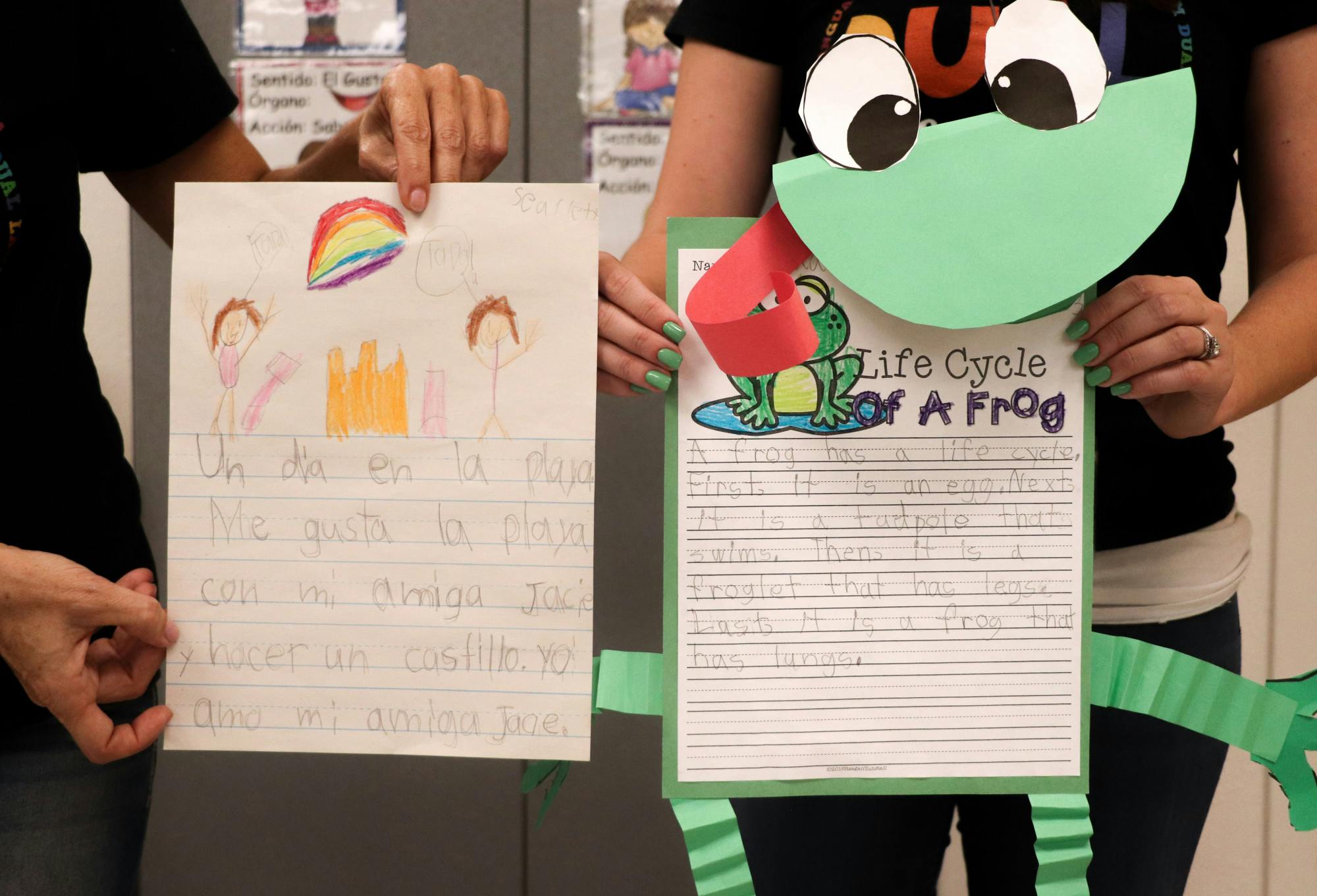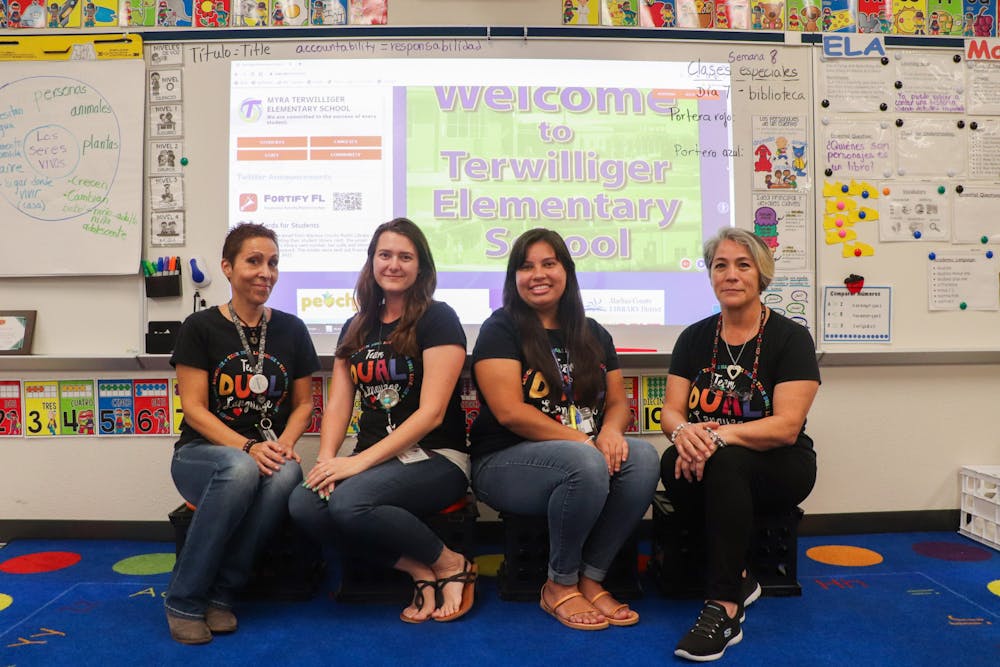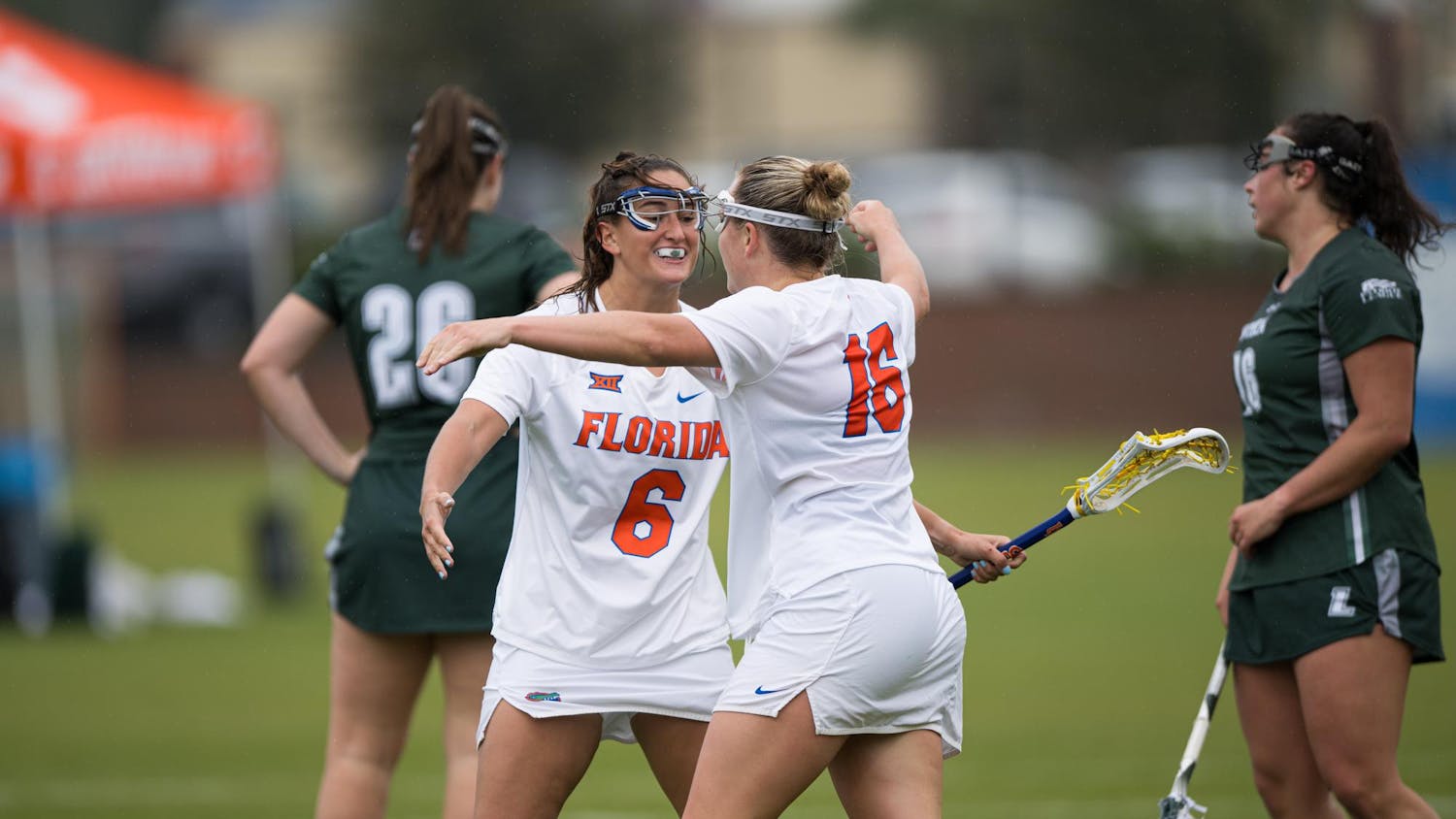Kennedy Stanley’s first day of kindergarten was not normal.
In many ways, she was similar to her kindergarten peers in other Alachua County Public Schools. Like them, her mom, Kayela Stanley, drove her to school, while she sat in the back seat, nervous for the first day.
The difference is, Kennedy was headed to Spanish class at Terwilliger Elementary School — ACPS’ only dual-language immersion school — having never heard or spoken Spanish at home in her life.
“When I left her, the poor child, her eyes were wide,” Kayela said. “She had no idea what was going on.”
But by the end of the first day, Kennedy came home saying “hola,” and by the end of the first week, she could count in Spanish, Kayela said.
Terwilliger is Alachua County’s first and only public school to offer dual language immersion as a magnet program, with that language being Spanish. The program is in its second year, with its first class of students starting first grade.
Students spend half the day learning in English and another half in Spanish, allowing them to be fully immersed in the languages.

Now in first grade, 6-year-old Kennedy can form full sentences — in fact, counting in Spanish is her party trick.
Her teachers, Mayte Ambite-Calvo, who teaches math, science and Spanish, and Desiree DiPerna, who teaches social studies, writing and English, led the program’s pilot class in kindergarten, and then moved up with them to teach first grade.
Now, DiPerna and Ambite-Calvo plan to stay in first grade, Diperna said.
Their classrooms are connected with a shared door, which acts as a portal between the Spanish-speaking and English-speaking worlds. On one side, posters and supplies are written entirely in Spanish, and on the other, in English; but both work together to fully immerse students in the language they’re learning.
Ambite-Calvo’s students now exclusively speak Spanish in her class — and they expect her not to speak English either, even when there’s guests in the room.
“We have seen so many good things, how much they are learning and how much they enjoy to be with us,” she said.
Gabby Smolenski, who teaches the English portion of kindergarten dual language, learned to teach kindergarten from DiPerna. She shadowed DiPerna for a year as part of the UF ProTeach program, a year-long internship in the last year of the elementary education degree.
“I just love languages,” she said. “And so I think the program was just a perfect fit, and it just worked out really well. I wasn't planning on this, but it all came together really nicely.”
Terwilliger is one out of more than 100 schools that offer similar programs in Florida, some in Spanish and some in Creole.
There are 33 K-12 schools that offer dual language immersion in Palm Beach County, including some in middle and high school, where Terwilliger kindergarten Spanish teacher Ana Zuber taught dual language for 14 years.
Zuber came across the role at Terwilliger by accident when she moved to Alachua County, and she’s amazed by the way her current students work together, she said.
“They communicate so well,” she said. “They share ideas, they share expectations, they share their materials, they share everything. So I'm very happy to work with this group.”

Recent research on bilingual children shows they often have a better memory and switch more easily from one task to another than monolingual kids, according to the National Institute of Health.
The teachers were proud to show off their students’ work — annotating texts in kindergarten and writing full sentences in both languages by first grade demonstrate the students’ comprehension, they said.
The fate of Terwilliger’s dual language immersion program is still uncertain, given the school doesn’t yet have Spanish teachers for second through fifth grade. However, the program is meant to expand each year up to fifth grade, and school principal Heather Harbour is not aware of any plans to end the program, she wrote in an email.
As a parent of a first grader in the dual language immersion program, 44-year-old Crystal Marull is nervous about whether the program will continue, she said. When her son was in kindergarten, she never received formal confirmation that the program would expand — rather, she noticed applications were being accepted and assumed the program would stay open.
“It would be great if we could just breathe deep and relax and know that it's going to be there for at least K to five,” she said. “There's always a lot of uncertainty about a program like this, and that makes us nervous and anxious.”
For Marull, transportation is the school’s biggest drawback. Her son, 6-year-old Sebastian Marull, catches the bus around 6:35 a.m. and rides for about half an hour each way.
“It's inconvenient, but it's definitely a sacrifice that we're willing to make for the program itself,” she said.
But even so, the program has been phenomenal, Crystal said. Her husband’s family is Argentinian, so Sebastian knowing Spanish means he can communicate with his grandparents from abroad. And Sebastian has become more open to learning and speaking Spanish at home since starting at Terwilliger, she said.
“Ms. DiPerna and Ms. Mayte are just miracle workers,” she said. “They have been able to put the plane together as they’re flying it with such a high degree of quality. I couldn't be happier.”
Tursys Arias, 31, also noticed her daughter, first grader Lisbeth Arias, has spoken better Spanish since starting the program. Even though Lisbeth grew up speaking Spanish at home, her accent has reemerged and she’s speaking less Spanglish — a combination of English and Spanish — Tursys said.
“It's been so helpful because she speaks great by now,” she said. “You can hear her speaking and you won’t believe that she was speaking more English than Spanish.”
Terwilliger is one of six ACPS elementary schools that offer magnet programs. Magnet programs require parents to submit an application to enroll for the following school year; if that application is approved and the student is selected, he or she can enroll in the program.
The program wouldn’t exist if it weren’t for families submitting applications and enrolling, Ambite-Calvo stressed.
“The real superheroes here are the students,” Ambite-Calvo said. “Because they work so incredibly hard for this every day,” DiPerna added.
Contact Alissa Gary at agary@alligator.org. Follow her on Twitter @AlissaGary1.

Alissa is a sophomore journalism major and University Editor at The Alligator. She has previously covered student government, university administration and K-12 education. In her free time, she enjoys showing photos of her cats to strangers.






